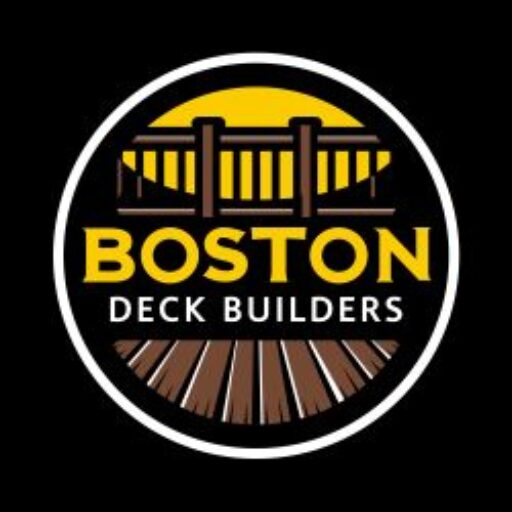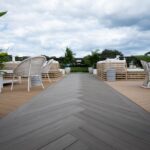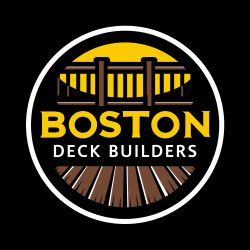If you’re planning to build a new deck or upgrade an old one, safety should be just as important as style.
One thing many homeowners don’t think about right away is how fire-resistant their deck materials are.
But in Massachusetts, summers can get dry, and fall brings windstorms with flying embers.
Fire safety is something you want to take seriously.
This is especially true if you live near wooded areas or in a neighborhood with close-set homes.
At Boston Deck Builders, we help Eastern Massachusetts homeowners choose deck boards that look great and offer peace of mind.
Below we list the most popular decking products and their fire resistance rating.
Why Fire Resistance Matters for Decks
Most people think of fire hazards inside the home, but outdoor fires can spread just as quickly—especially through decks and porches.
A flying ember from a nearby chimney or fire pit can land on your deck and ignite certain materials in seconds.
That’s why fire-resistant decking materials are such a smart choice.
They can slow the spread of flames, resist ignition, and give you more time to respond if there’s ever a fire.
Understanding Fire Ratings
A quick note on how fire resistance is rated.
Deck boards (like roofing and siding) are often given a Class A, B, or C fire rating:
- Class A = Highest level of fire resistance (best)
- Class B = Moderate resistance
- Class C = Basic protection (least)
The higher the rating, the longer the material can resist flame spread before it burns or catches fire.
Decking Materials and Their Fire Resistance
Comparing fire resistance of decking materials.
- Composite Decking (High-Performance Brands like TimberTech or Trex)
Composite deck boards are made from a blend of recycled plastic and wood fibers.
Many of the high-end brands offer composite boards with fire-retardant additives that earn them a Class B or even Class A rating.
- Pros: Won’t splinter, rot, or warp; low maintenance; good fire resistance with the right product line.
- Cons: Not all composites are fire-rated—be sure to check the specs.
Good to know: If you’re looking for the best fire-resistant composite options, ask us about TimberTech composite decking or Trex Transcend Fire Defense lines.
- PVC Decking
PVC decking is made entirely of plastic, which means there are no wood particles to ignite.
Some PVC boards carry a Class A fire rating, making them a top choice for wildfire-prone areas.
- Pros: Extremely resistant to moisture and insects; high fire rating; doesn’t burn easily.
- Cons: Can be more expensive than wood; some people prefer the look of real wood.
Pro tip: Brands like AZEK by TimberTech offer PVC boards specifically tested for flame spread ratings and ignition resistance.
- Pressure-Treated Wood Decks
Pressure-treated wood is one of the most affordable decking materials out there.
It’s been chemically treated to resist rot and insects—but not necessarily reducing the risk of fire.
- Fire rating: Typically Class C, unless specially treated for fire resistance.
- Pros: Budget-friendly and easy to find.
- Cons: Needs regular staining and sealing; lower fire resistance unless upgraded.
You can get pressure-treated lumber that’s fire-retardant treated, but it usually costs more and may not be stocked at your local hardware store.
- Hardwood Decking (Like Ipe or Mahogany)
Hardwoods are dense and naturally more fire-resistant than softwoods.
Some types, like Ipe, have a Class A flame spread rating, which is the same as concrete or steel.
- Pros: Strong, long-lasting, beautiful natural look, excellent fire performance.
- Cons: Expensive and harder to install; needs oiling to maintain color.
In Boston neighborhoods, hardwood decking can be a stunning and high-performance choice.
Choosing the Right Decking Material for Your Boston Area Home or Business
So, which material is best for your deck?
It depends on your budget, your style, and your location.
If you’re in the city, you may need to follow specific building codes that call for fire-resistant materials—especially for rooftop or multi-family decks.
If you’re in a suburb or near wooded areas like the Blue Hills or Middlesex Fells, it’s best to choose decking that can slow or resist flames.
At Boston Deck Builders, we’ve built decks across Greater Boston.
We know the local codes, the climate, and what works in real life.
We’ll help you pick a decking material that looks great, lasts long, and gives you and your family extra protection from fire risks.
Build a Safer, Smarter Deck in Eastern MA
If you’re building a new deck or replacing an old deck, we’ll review your fire-resistant decking options.
Together we can create an outdoor living space that’s beautiful, durable, and built with safety in mind.
Serving Boston, Natick, Norwood, Norton, Newburyport, Worcester, Plymouth, and all surrounding areas across Eastern MA, plus Providence RI.
Get a free consultation today and build your deck with confidence.





